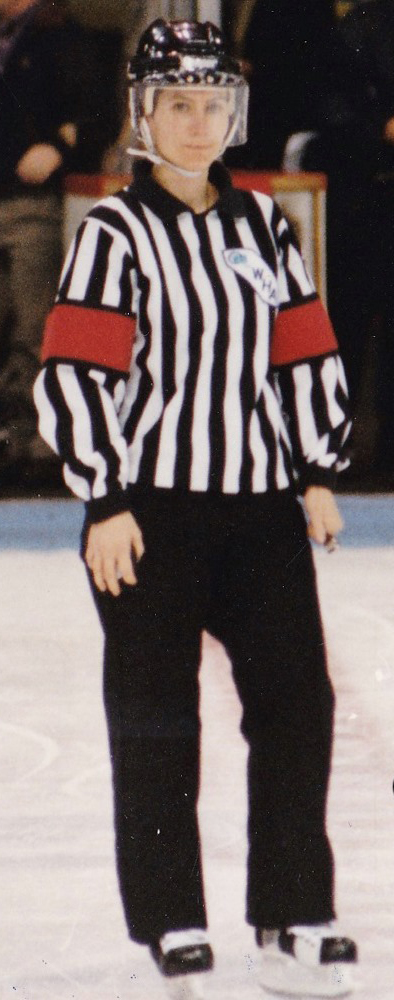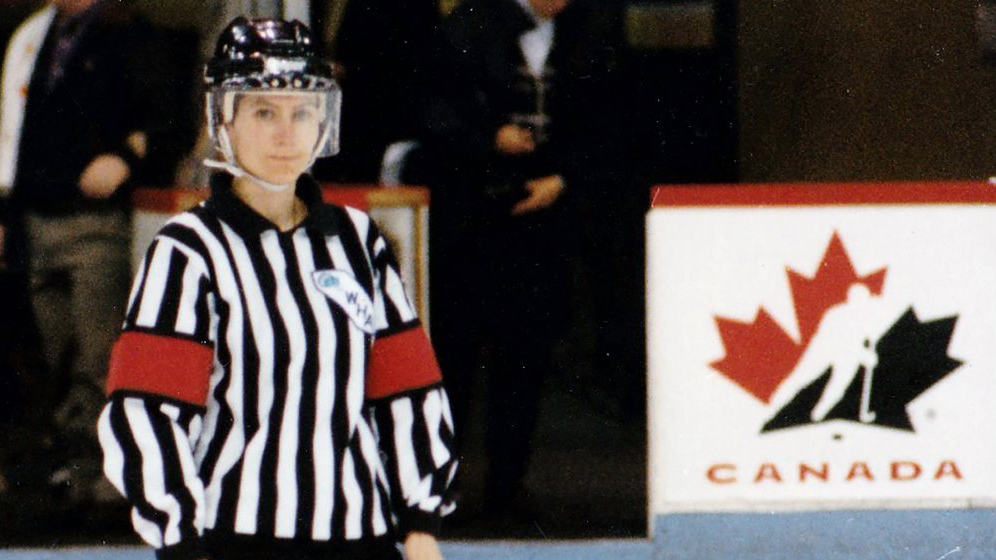Ottawa has a long and proud sport tradition, and in this ongoing series, we will present highlight moments and figures from our local sport history. The Ottawa Sport History Highlight series is produced collaboratively by the Ottawa Sports Pages and the Ottawa Sport Hall of Fame, which has welcomed almost 300 inductees dating back to its establishment in 1968. Class of 2020-2021 Sport Hall inductee Marina Zenk is highlighted in this edition.

Ottawa’s new Professional Women’s Hockey League team is set to write a new chapter in women’s hockey history as it prepares for the start of its first season. When the puck is dropped for the first faceoff in January, it will likely represent the biggest moment in the evolution of women’s hockey since the sport was added to the Winter Olympics in 1998.

No one had a better view of the first Olympic women’s hockey tournament than Ottawa’s Marina Zenk. She refereed the gold medal game in Nagano between Canada and USA – the first pinnacle battle between the North American neighbours who have combined to make one of sport’s best rivalries.
It was the pinnacle of Zenk’s officiating career too. But, for Zenk, the never-before explored path up that mountain was fraught with doubt, a seemingly unbendable rule and, in the end, shock.
A year before women’s hockey made its Olympic debut, the highly respected and diminutive referee from Gloucester left the 1997 World Women’s Hockey Championship in Kitchener-Waterloo convinced she would never be assigned to the Olympics.
Zenk’s officiating career was winding down and she wasn’t selected to referee one of the two semifinals, the bronze-medal game or the final at her first worlds, which featured an all-women’s officiating team for the first time.
Zenk refereed four games at the 1997 Worlds, including the opener between the United States and Norway. The assessments she received for her round-robin games were good, but for the first time in her career she wasn’t assigned a key game.
“I was crushed. My first Worlds and I thought my Olympic chances were over,” Zenk recalled in an interview with Martin Cleary in advance of her induction into the Ottawa Sport Hall of Fame in 2020. “These Worlds were the last (major championship) to be seen by the IIHF (International Ice Hockey Federation).
“I left feeling disappointed. It was time to pack it in. I began to soul search and asked myself: ‘Do you still want to do this?’ I knew four years later (2002 Olympics) I couldn’t do it. I had put my professional career on hold, and my legs could only go so long. I had been blessed with many opportunities.”
Staying on
After talking if over with her peers and working extra hard to perform well at off-season selection camps in Lake Placid, New York and Andorra, Spain, Zenk convinced herself not to blow the whistle on her career.
And in the end, Zenk, 56, not only reached the 1998 Winter Games in Nagano, Japan, as one of two Canadian female referees, but also made history by refereeing the first-ever women’s Olympic hockey game between Finland and Sweden.
But refs are no different than the players they watch with critical eyes. Naturally, Zenk wanted to be on the ice for the gold-medal game. Her career was filled with a variety of gold-medal finals. The rule book, however, stated the gold-medal game could not have a referee from either of the two countries playing for the championship. As expected, the final was between Canada and the United States. Zenk knew the farthest she could go at the Olympics was to oversee the bronze-medal game.
Baffling breakfast
On the day of the two medal games, Zenk went to breakfast knowing she would referee the bronze match between Finland and China. But a chance meeting with IIHF Referee-in-chief Bob Nadin turned her world upside down.
“I went for breakfast, met Bob and he said: ‘How are you feeling today?’ I said good. He said: ‘You’re doing the gold-medal game,’” Zenk said, recalling that unbelievable moment.
“I had done so many finals and big games and I had a lot of confidence in my abilities. It was another game with two teams with a rivalry competing for a championship. I didn’t see friends playing, I saw players.”
Nadin approached Zenk after Manuela Groger-Schneider of Germany became sick and then Sandra Dombrowski of Switzerland took ill.
There was concern about a Canadian official refereeing the final involving the Canadian team. But everything went well and the United States won the gold medal 3-1. The fast-paced and tight game was relatively clean as Zenk assessed the U.S. four minor penalties and Canada three.
Before the American players received their gold medals and the Canadians the silver, Zenk quietly left the ice, but not unnoticed.
“I remember getting off the ice and (IIHF head of the referee committee and now president) Rene Fasel is there. He was grinning from ear to ear. He shook my hand. It was probably out of a sense of relief. It was the first time an official from a (finalist) country had refereed the final and nothing happened.”
A few days later, Zenk met Canadian women’s head coach Shannon Miller, who also extended her congratulations for a game well called.
Zenk finished the Olympics refereeing four games and serving as a lineswoman once.
Early beginnings
Marina Zenk started her 15-year officiating career while attending and playing women’s hockey at Seneca College. She was encouraged by Angela James, a Seneca teammate and future Hockey Hall of Fame inductee, to referee intramural games as a part-time job.
During her four years as a player at Seneca, Zenk made her mark on the ice, helping the Toronto-based college reach four Ontario Colleges Athletic Association women’s hockey finals and winning three (1984, 1985, 1987).
A point-a-game scorer in four playoff seasons, Zenk finished her Sting career as the fifth-highest scoring player in OCAA history with 47 goals and 53 assists for 100 points. She also was named to the OCAA Hall of Fame in 2013 as well as the OCAA women’s All-Millennium hockey team.
After college, Zenk returned to Ottawa and officiated high-level boys’ bantam and midget games, which were at the same pace as women’s hockey. Her hard work and dedication earned her multiple assignments at provincial and national championships, including many gold-medal games.
Zenk’s first international assignment was the Asian women’s qualifying championship during the 1993-94 season in Obihiro, Japan. She also has had international assignments at the Pacific Rim championship, 4 Nation’s Cup (two) and a European women’s pool B championship.
Paying it forward
When she retired from officiating, she took her knowledge and enthusiasm into volunteer administration work with Hockey Canada, becoming the first Development Coordinator for female officials.
“I had reached a point in my career where I had done it all and given a huge commitment,” said Zenk, who earned the Hockey Canada Female Breakthrough Award in 2001 for her achievements. “I felt the shift to make a difference in administration and a position (Development Coordinator for female officials) evolved.”
She also was a supervisor, instructor and Referee-in-chief with Hockey Canada, the Ontario Women’s Hockey Association, the Ottawa District Women’s Hockey Association, the Ottawa District Hockey Association and the Ottawa District Minor Hockey Association.
In 1999, she enthusiastically accepted the role of Hockey Canada Referee-in-chief and Supervisor for the Canada Winter Games in Cornerbrook, NL. About the same time, she was asked to referee at the 1999 World Women’s Hockey Championship in Espoo, Finland, because of a shortage of female officials. She accepted her second Worlds assignment on one condition—that she could still oversee the Canada Winter Games.
It all worked out. And unlike the 1997 World Championships, where Zenk was a spectator for the medal games, Zenk refereed the 1999 World gold-medal between Canada and the United States.
Read more on local women’s hockey history in CBC Ottawa’s recent story on the Ottawa Alerts (the possible name for Ottawa’s new PWHL franchise) and Ottawa Sport Hall of Fame inductee Shirley Moulds, who won six Canadian hockey championships from 1919-1925.


Leave a comment